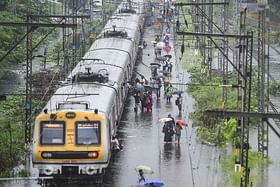Micro tunnels are a trenchless solution for constructing small diameter tunnels, used especially for projects that require the tunnel to cross under dense traffic roads, railways and rivers.
The authorities at CR have also identified multiple locations that are prone to waterlogging during the monsoon in Mumbai.
The Central Railways (CR) in Mumbai plans to prevent track flooding during the monsoon season by conducting microtunneling in flood-prone areas.
This proactive approach has come in following the successful completion of the technique at Masjid and Sandhurst Road.
Micro tunnels are a trenchless solution for constructing small diameter tunnels, used especially for projects that require the tunnel to cross under dense traffic roads, railways and rivers.
The tunnelling involves building small drains approximately two to three meters below railway tracks to prevent waterlogging during heavy rainfall.
These mini drains are linked to storm water drains that pump out the water.
The Central Railways is constructing micro tunnelling on Diva-Kalwa, Vikhroli-Kanjurmarg and Sion-Kurla routes for pre-monsoon preparations.
As per Hindustan Times report, work began in March and is expected to conclude before this year’s monsoon season expected in June or July.
“At present, microtunneling work is underway at Sion on the CSMT end, at Kalwa and Kalwa-Mumbra sections,” said Shivaji Sutar, chief public relations officer, Central Railways.
The track level is reportedly lower in certain spots and poses a challenge for water drainage.
Mukhyadhyapak nullah in Sion, for instance, is always filled with debris, hindering water flow out of the rail premises.
Further, on the Diva-Kalwa-Mumbra stretch, local residents alleged that ever since the new fifth and sixth rail lines came up, water logging incidents during rains have increased since the level of certain tracks is higher.
Constructing microtunnels comes as a viable solution to help drain out water from the rail premises.
A CR official stated, “We are building micro tunnels at Kalwa and also Kalwa-Mumbra stretch. The microtunneling work will be carried out on a 70 m stretch below the tracks at two different locations between Kalwa and Mumbra. The drainage will have a depth of at least 2 metres below rail tracks,”, as per the HT report.
The authorities at CR have also identified multiple locations between Vikhroli and Kanjurmarg that are prone to waterlogging, with at least two to three specific sites in the area.
To address these issues, CR has invested over Rs 150 crore in the past few years.
Larger projects, such as box pushing techniques at Wadala and Chunabhatti stations, are also currently in progress, with funding being shared by municipal corporations.
In addition, measures are being taken to prevent to waterlogging at the Kalwa car shed, and avoid delays in train operations.
Furthermore, the Western Railway (WR) has also conducted microtunneling work at various stations — such as Virar, Nallasopara, Vasai, Borivali.


